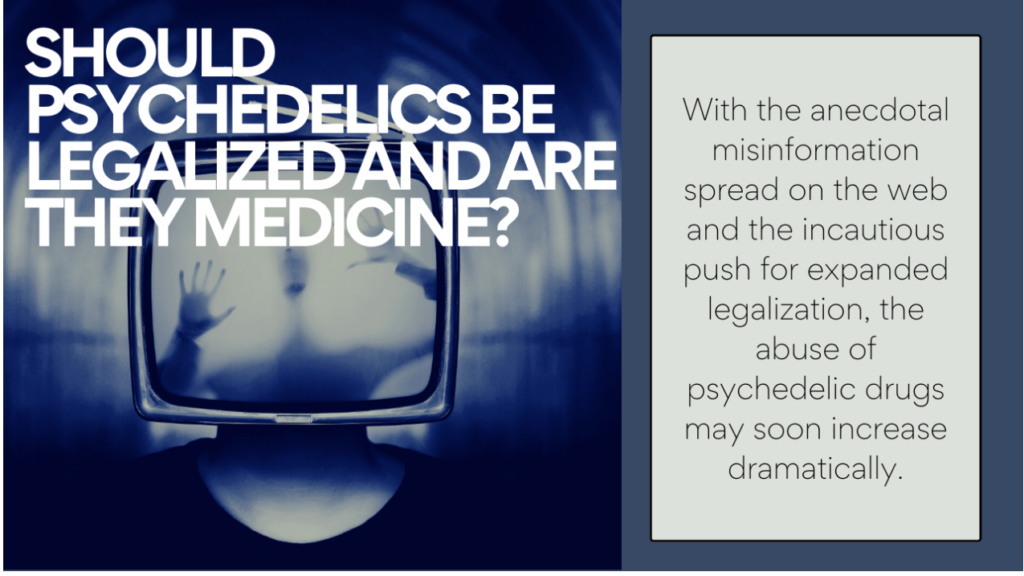- Psychedelic Drug Legislative Reform and Legalization in the US 2022, December 7
- Should we be leery of being Leary? Concerns about psychedelic use by psychedelic researchers 2022, November 15
- Single-Dose Psilocybin for a Treatment-Resistant Episode of Major Depression 2022, November 3
- Should Psychedelics Be Legalized And Are They Medicine? 2022, September 12
- A Physician’s Attempt to Self-Medicate Bipolar Depression with N,N-Dimethyltryptamine (DMT) 2017, July 7
Psychedelic Drug Legislative Reform and Legalization in the US
Jama Network, 2022, December 7
Psychedelic drugs are becoming accessible in the US through a patchwork of state legislative reforms. This shift necessitates consensus on treatment models, education and guidance for health care professionals, and planning for implementation and regulation.
Legislative reform for psychedelic drugs has been proceeding in a rapid, patchwork fashion in the US. Further consideration should be given to key health care issues such as establishing (1) standards for drugs procured outside the medical establishment, (2) licensure criteria for prescribers and therapists, (3) clinical and billing infrastructure, (4) potential contraindications, and (5) use in special populations like youths, older adults, and pregnant individuals…
Should we be leery of being Leary? Concerns about psychedelic use by psychedelic researchers
National Center for Biotechnology Information 2022, November 15
Psychedelic research is proceeding rapidly, despite ongoing legal and regulatory barriers and lingering questions about study design, such as the difficulty of ensuring adequate blinding, the relative overrepresentation in studies of participants who have previously used psychedelics, and the importance of personal experience with psychedelics for those who provide psychedelic-assisted therapy. Here we wish to explore a distinct concern: whether personal use of psychedelics by researchers could threaten the objectivity and ethical conduct of psychedelic research itself. In 2020, Anderson et al. suggested that psychedelic use could lead even “conservative individuals to become wildly enthusiastic about the potentials of psychedelics to heal and transform”. Recent popular press criticisms of psychedelic science, in particular critiques of the MAPS Phase II and Phase III MDMA-Assisted Therapy trials for PTSD, have also raised questions about whether personal use of psychedelic drugs by psychedelic therapists could compromise scientific objectivity, lead to the exploitation of research subjects, or promote biased reporting of results. Here, we elaborate on and attempt to delimit these concerns, with the goal of informing policy related to psychedelic research and the eventual clinical use of psychedelics. In particular, we explore whether the possibility that psychedelic use can directly and positively affect investigators’ enthusiasm about psychedelics themselves raises concerns about bias and scientific integrity. We then discuss several practical strategies to reduce perceived conflict of interest…
Single-Dose Psilocybin for a Treatment-Resistant Episode of Major Depression
The New England Journal of Medicine 2022, November 3
In this phase 2 trial involving participants with treatment-resistant depression, psilocybin at a single dose of 25 mg, but not 10 mg, reduced depression scores significantly more than a 1-mg dose over a period of 3 weeks but was associated with adverse effects. Larger and longer trials, including comparison with existing treatments, are required to determine the efficacy and safety of psilocybin for this disorder…
Should Psychedelics Be Legalized And Are They Medicine?
Every Brain Matters 2022, September 12

The legalization process does not stop with marijuana. The pro-drug agenda is taking the next step to legalizing all drugs by asking Colorado voters to create another for-profit drug industry by increasing access to psychedelic drugs by creating state “Healing Centers” or places where the public can readily purchase them. This will add more confusion and complexity to the growing addiction, mental and physical illnesses, and the regulatory nightmare that has resulted from states legalizing cannabis for profit…
A Physician’s Attempt to Self-Medicate Bipolar Depression with N,N-Dimethyltryptamine (DMT)
2017, July 7
N,N-dimethyltryptamine (DMT) is a psychoactive substance that has been gaining popularity in therapeutic and recreational use. This is a case of a physician who chronically took DMT augmented with phenelzine in an attempt to self-medicate refractory bipolar depression. His presentation of altered mental status, mania, and psychosis is examined in regards to his DMT use. This case discusses DMT, the possible uses of DMT, and the theorized mechanism of DMT in psychosis and treatment of depression, particularly involving its agonist activity at 5-HT1A, 5-HT2A, and 5-HT2C. It is also important to recognize the dangers of self-medication, particularly amongst physicians…

